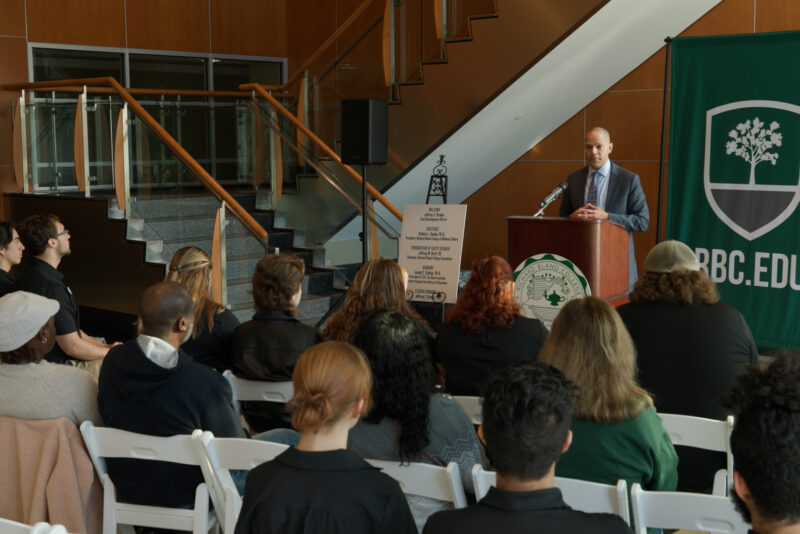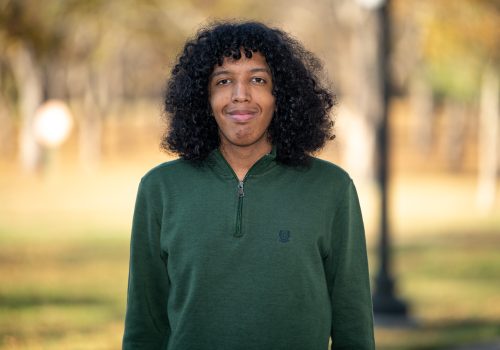Javaid Siddiqi, Ph.D.: Working In The Middle

This RBC alumnus’ life work is to reform education for our leaders of tomorrow.
By Sterling Giles
The trajectory of Dr. Javaid Siddiqi’s (’98) life calling is the furthest thing from linear. A native of Chesterfield, Va., Siddiqi went into his undergraduate studies wanting to pursue a career as a doctor. Today, he sits at the helm of The Hunt Institute, a nonpartisan leader in K‐12 education policy and political leadership.
Siddiqi admittedly had a subpar first semester as a Longwood University freshman. Rather than continuing his tenure there and shelling out thousands of tuition dollars, he decided to attend Richard Bland College of William & Mary (RBC) to reset.
“I was able to live at home and was able to get back on track,” Siddiqi said. “[At Richard Bland College, the] professors knew my name and they knew my struggles.
“They knew when I was late or didn’t show up for class. And they made you feel a certain way when you didn’t come because they cared in a way that big universities don’t.”
Siddiqi also spoke highly of RBC’s Dual Enrollment program, which he has spent more than 15 years advocating for first as a part of former Virginia Gov. Bob McDonnell’s administration and now at The Hunt Institute.
“It has become a personal passion for me,” he said. “I [advocate for] dual enrollment more so than AP (Advanced Placement) or IB (International Baccalaureate) courses because there’s [more] transferability.”
Upon graduation from RBC, Siddiqi matriculated at Virginia Commonwealth University (VCU). He remained in the Biology/Pre-Med track his first year there. But in his final year there, he decided he wanted to pursue a career in education.
However, Siddiqi stayed the course and earned his bachelor’s degree in Biology. But since he wasn’t a licensed teacher, his first stop post-grad was serving as a probationary teacher (a teacher being evaluated for suitability at an institution) in Chesterfield, Va.
He would later earn a master’s degree in Educational Leadership at Virginia State University where his father was a professor for many years. To round out his educational journey, Siddiqi returned to VCU and earned his Ph.D. in General Educational Leadership and Administration.
In 2004, Robious Elementary School was the first school in the state to implement Expeditionary Learning, a revolutionary, inquiry-based approach that improves school culture by making curriculum more relevant to students.
Siddiqi—who was the principal of Robious Middle School at the time—and his teaching staff were convinced the middle school curriculum needed an overhaul. So they decided to partner with Robious Elementary’s educators to adopt its Expeditionary Learning program. The middle school officially implemented the initiative in 2006, making it the first secondary school in the Commonwealth to do so.
“We found that phonics was the way that kids learn best to read,” Siddiqi said. “I didn’t realize this, but we were about five years ahead of the game and 10 years ahead of most of the Commonwealth of Virginia.”
Research shows strong literacy correlates with high school graduation rates, college enrollment rates and lifetime earning potential.
After serving as principal of Robious Middle School for roughly four years, Siddiqi was appointed Deputy Secretary of Education for the Commonwealth of Virginia in the fall of 2011. Two years later, he was promoted to Secretary of Education.
After leaving his post as Secretary of Education, Siddiqi served on several boards, including Voices for Virginia’s Children, Chesterfield County School Board and the Radford University Board of Visitors, among others. Additionally, he was handpicked as an honoree of the inaugural RBC Foundation Notable Alumni class in 2017.
Siddiqi was hired by The Hunt Institute in 2014 and three years later, he was named President & CEO. Founded by former North Carolina Gov. Jim Hunt, the longest-serving governor in the state’s history, the nonpartisan Institute works to design strategy, shape policy and drive educational improvements at the national and state levels.
“Dr. Siddiqi’s work at The Hunt Institute profoundly influences education policy, strategy and improvement,” said RBC President Debbie L. Sydow, Ph.D. “Javaid and his team are committed to lifting up individuals and communities by improving education at its core.
“So in my mind, this is sacred work.”
One of The Hunt Institute’s seminal initiatives, One Million Teachers of Color, is aptly titled. Within a decade, the Institute, in collaboration with several education reform partners, are campaigning to add one million teachers of color, as well as 30 million leaders of color, to U.S. schools. According to the initiative’s website, 80 percent of teachers are white and 40 percent of schools don’t have a single teacher of color.
According to Education Northwest, students of color who have at least one teacher of color tend to perform better in the classroom and are less likely to have disciplinary issues. Research also shows white students show improved problem-solving, critical thinking and creativity when they have diverse teachers.
The nonpartisan nature of Siddiqi’s work is an extension of his frame of mind.
“I’ve learned so much about how to navigate the nuance of the middle,” he said.
He pointed out compromise is necessary in every facet of life, especially in policy work. He cautioned against operating in polarity because it impedes progress.
“It speaks to the diversity of thought that we need to have as a country because we are divided,” Siddiqi said. “We’re not willing to consider somebody else’s perspectives or shared experiences or life experiences.”
However, in the same breath, Siddiqi acknowledges being outspoken about what you believe in and advocate for is paramount as well.
“Your voice matters,” he said. “Your experiences matter.”
But if you don’t share them, they will never matter.”


